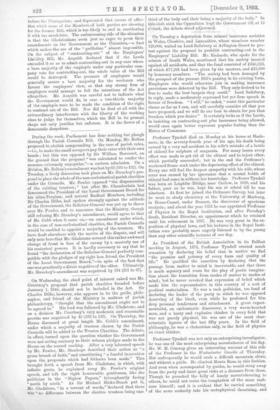On Wednesday, the chief point of interest raised was Mr.
Courtney's proposal that parish charities founded before January 1, 1840, should not be included in the Act. Sir Charles Dille, however, who appears to be the guide, philo- sopher, and friend of the Ministry in matters of parish philanthropy, "thought that the amendment ought not to be agreed to." His lead was followed by Mr. Gladstone, and on a division Mr. Courtney's very moderate and reasonable proviso was negatived by 45 (183 to 138). On Thursday, the House discussed at great length Mr. Cobb's amendment, under which a majority of trustees chosen by the Parish Councils will be added to the Trustee Charities. The debate, in effect, turned upon the question whether the Government were not acting contrary to their solemn pledges made to the House on the second reading. After a very laboured speech by Mr. Fowler, Mr. Stanhope described their action as "a gross breach of faith," and constituting "a fearful innovation upon the proposals which had hitherto been made." This brought forth a speech from Mr. Gladstone, in which, with infinite gusto, he explained away Mr. Fowler's original speech, and left the right honourable gentleman, like the politician in the " Biglow Papers," triumphantly facing "north by south." As Sir Michael Hicks-Beach put it, Mr. Gladstone, "in a torrent of words," declared that there was "no difference between the elective trustees being one- third of the body and their being a majority of the body." In this cleft stick the Opposition kept the Government till, at 12 o'clock, the debate stood adjourned.






































 Previous page
Previous page